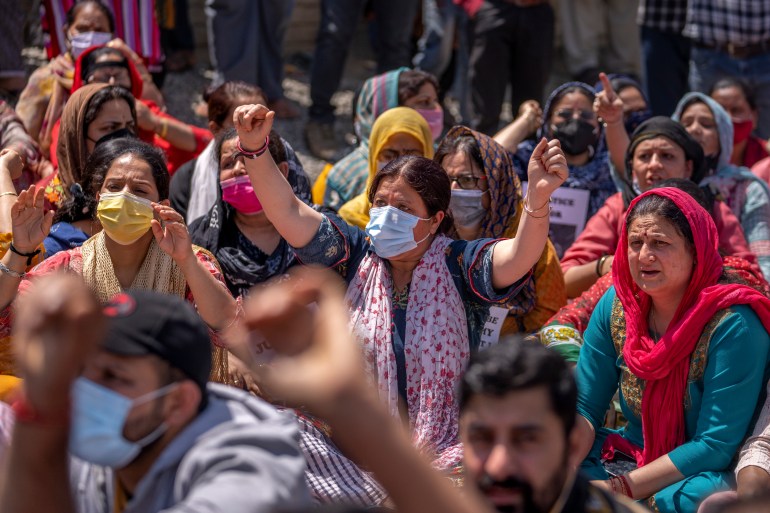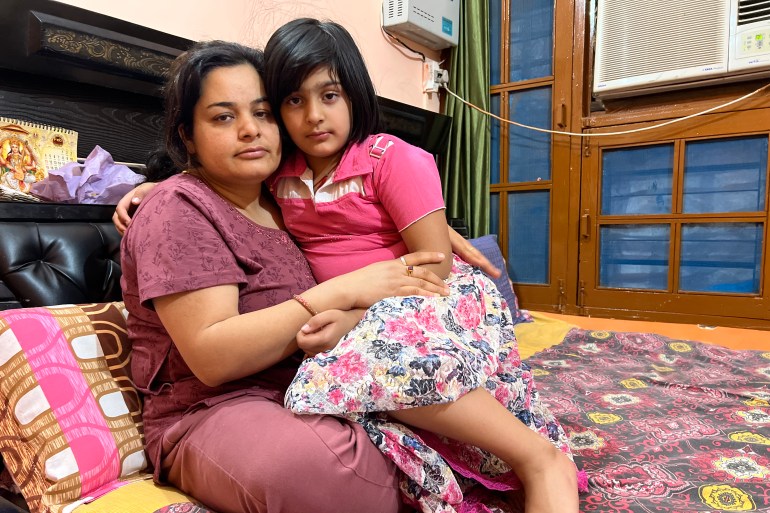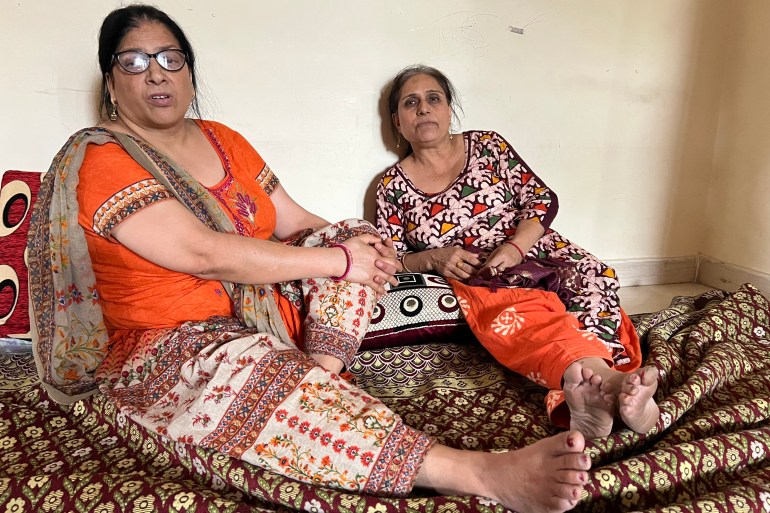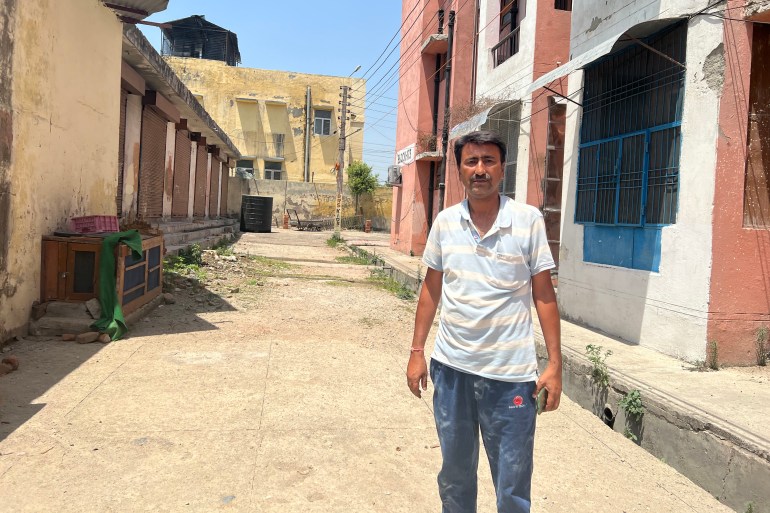As Kashmir’s Hindus face targeted killings, hundreds flee valley | Conflict News
A series of targeted attacks on Hindus in Indian-administered Kashmir since late last year has sent shockwaves through the region’s minority community, forcing hundreds to leave the valley since last month.
Earlier this week, suspected rebels shot dead Rajni Bala, a 36-year-old teacher, near the entrance of a government school in Kulgam district where she taught.
On Thursday, a bank employee, Vijay Kumar, from the western Indian state of Rajasthan, was shot in the same district – the second killing of a Hindu in the valley in three days.
Since the abrogation of Indian-administered Kashmir’s limited autonomy in 2019, the region has witnessed a spike in violence against Kashmiri Hindus, known locally as Pandits.
The Kashmiri rebels see the Pandits and even local Muslims employed by the government in police and other departments as collaborators of the Indian regime in the country’s only Muslim-majority region.
The rebels have been waging an armed uprising against New Delhi since the late 1980s, demanding either an independent Kashmir state or its merger with neighbouring Pakistan.
Nearly 250,000 Kashmiri Pandits fled Indian-administered Kashmir after the rebellion that started in 1989 saw the killings of Hindus and attacks on their homes.
A 2008 report by the region’s police, which conducted a survey of its own cases between 1989 and 2008, said the rebels killed 209 Kashmiri Pandits in that period, including 109 murders in 1989 and 1990, when the violence against them was at its peak.
Hindu right-wing groups and even a recent Bollywood film, however, claim that number was in the thousands, with some even calling the targeted killings a “genocide”.
The Himalayan territory of Kashmir was split between India and Pakistan when the subcontinent was partitioned in 1947. The two nuclear powers claim the region in its entirety and have fought two of their three full-scale wars over the territory.
Tensions in the valley have peaked since 2019, with Prime Minister Narendra Modi’s government implementing legislation which local Muslims say aims to change the demographics of the region.
Backed by the presence of nearly 600,000 Indian soldiers in the valley, making it the most militarised region in the world, Modi’s government has also been pushing to relocate the displaced Pandits in the valley, triggering targeted attacks by suspected rebels.
Only this year, at least 16 such killings have taken place. Last month, suspected rebels shot dead Rahul Bhat inside his office in Budgam district.
The killing sparked days of protests by hundreds of Pandits living in high-security neighbourhoods, locally called migrant colonies, spread across the picturesque valley.

Demands of relocation
The spate of killings of Pandits has reignited protests by the community, who despite assurances of safety by the government, are demanding their relocation outside the volatile region.
In a memorandum to the region’s administrate head Manoj Sinha on May 23, government employees belonging to the Kashmiri Hindu community threatened “en-masse resignation” if their demands are not met.
“The recent killing … has left us with no hope and sustaining power to live in these darkest hours,” said the memorandum.
“All the valley-posted Kashmiri minority employees should be immediately shifted outside this province to stop any further bloodshed,” it added.
Nearly 150 Pandit employees have left the region since the middle of the last month, an official told Al Jazeera on condition of anonymity.
Media reports on Thursday said police sealed off a Kashmiri Pandit area in the main city of Srinagar and stepped up security around places where Hindu government employees live.
Nearly 3,800 Pandits had returned to the valley under a federal government’s rehabilitation policy launched in 2008. The policy included promises of government jobs and secure accommodation for the minority community.
‘How can I go back to Kashmir?’
But now, amid the killings and threats, many displaced Pandits are not sure if they want to return to the valley.
Bhat, who was killed last month at 35, had taken up a government job in 2011 to return to his roots after being displaced in the early 1990s.
“My world has collapsed. What was his fault? Why was this done to him?” his wife Meenakshi Bhat told Al Jazeera at her home in the Durga Nagar area of Jammu in the southern part of Indian-administered Kashmir, where a large number of Pandits have been living since 1989.

“I want justice for him. How can I go back to Kashmir? I cannot,” she said. “For me, my dream of living in Kashmir is over with my husband’s killing.”
The Bhats have a seven-year-old daughter. “My daughter would always say she is her father’s fairy. She has been searching for him everywhere. What do I tell her?” said Meenakshi.
Rahul’s father Bitta Ji Bhat said “very little has changed in the last 30 years” for Pandits.
“There is no safety for us in Kashmir … We were being killed then and we are being killed now,” he told Al Jazeera.
“We want justice. For decades, only politics has been played in our name.”
Rahul’s aunt, Sarla Miskeen, migrated to Jammu in the 1990s. She says her son, an engineer, took up a government job in the Kashmir valley three months ago under the federal scheme, but refuses to return due to his cousin’s killing.
“My son is depressed and disturbed. He doesn’t want to go back now. We just want the government to shift him to Jammu permanently. How can he go back when one of our sons was killed there? What surety of safety do we have?” Miskeen told Al Jazeera.

Observers say the suspected rebels are targeting minorities and non-local workers in Indian-administered Kashmir to stop outsiders from settling in the disputed region.
The rebels have not even spared the Hindus who never left the valley. In October last year, Makhan Lal Bindroo, a well-known Kashmiri Pandit who ran a pharmacy in Srinagar’s commercial hub, was gunned down.
With the uptick in violence, many Kashmiri Hindus feel it has been three decades of “waiting and false promises” of safety by the successive regimes.
Sunil Pandita, 45, an engineer by profession, lives in Jammu’s Jagti camps, home to 4,000 Kashmiri Hindu families. He says any mention of his ancestral village in the valley’s Kupwara district brings tears to his eyes.

Uprooted 30 years ago, Pandita says he often sees his home in his dreams.
“I see apple orchards and the quiet villages. I remember the beautiful and carefree old days,” Pandita told Al Jazeera as he recalled how his family had to flee at night in a truck after they sensed tension in the village where just four Pandit families lived.
“Our Muslim neighbours tried to stop us, but they were themselves not sure whether they would be able to ensure our safety. Life has been a nightmare since then from one shelter to another, but no home,” he said.
But Pandita says going back to his ancestral village, when violence against the members of his community is increasing, “is out of the question”.
“As long as there is this politics of hate and division, going back to Kashmir is not possible for our community,” Pandita said.
“We thought the current government would solve our issues but they did nothing for us” he said. “The dream of home seems very distant right now.”

Pingback: 코인커뮤니티
Pingback: unicc
Pingback: 토렌트 다운
Pingback: Online medicatie kopen zonder recept bij het beste Benu apotheek alternatief in Amsterdam Rotterdam Utrecht Den Haag Eindhoven Groningen Tilburg Almere Breda Nijmegen Noord-Holland Zuid-Holland Noord-Brabant Limburg Zeeland Online medicatie kopen zonder r
Pingback: cinema rule
Pingback: helpful resources
Pingback: 1win